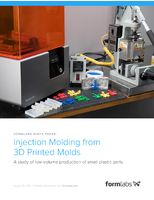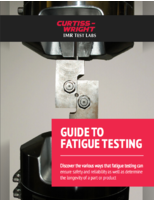Polyolefins Conference Leaders announce 2014 keynote speakers.
Press Release Summary:
Scheduled for Oct 5–8, 2014, sixteenth annual SPE® TPO Automotive Engineered Polyolefins Conference will showcase talks by 5 keynote speakers from WardsAuto, ExxonMobil Chemical Co., Dow Chemical Co., LyondellBasell, and General Motors Co. Interspersed throughout conference, keynotes will highlight important trends facing automotive-plastics market, including access to new feedstocks, approaching vehicle-efficiency mandates, and key pressures driving innovation.
Original Press Release:
Leadership of SPE® TPO Auto. Engineered Polyolefins Conference Announces Five 2014 Keynote Speakers
TROY, (DETROIT) MICH. – The sixteenth-annual SPE® TPO Automotive Engineered Polyolefins Conference, the world’s leading automotive engineered-polyolefins forum, will showcase talks by five keynote speakers from WardsAuto, ExxonMobil Chemical Co., Dow Chemical Co., LyondellBasell, and General Motors Co. Interspersed throughout the two-and-a-half-day conference, the keynotes will highlight important trends facing the automotive-plastics market, including access to new feedstocks, approaching vehicle-efficiency mandates, and key pressures driving innovation. Organized by the Detroit Section of the Society of Plastics Engineers (SPE), this year's technical conference and exhibition returns to the Troy Marriott in the Detroit suburbs from October 5-8, 2014.
On Monday morning, the conference begins with a keynote on Fuel Economy:Â Getting to 2025 as Efficiently as Possible by John Sousanis, director-Information Content & Presentation, WardsAuto.com and author of the WardsAuto State of the Industry Fuel Economy Report. "The 'final rule' announced by the U.S. Environmental Protection Agency (EPA) and National Highway Traffic Safety Administration (NHTSA) for fuel economy and greenhouse gas (GHG) emissions for 2017 through 2025 model light vehicles is the key driver behind accelerated lightweighting efforts throughout the automotive industry," explains Sousanis. "If met via fuel economy, the GHG emissions standards would require a projected fleet-wide average fuel economy rating of 54.5 miles per gallon (4.32 liters per 100 kilometers). However, the new standards face a midterm review beginning in 2017, with a 'final-final' ruling due in 2018. In my talk, I'll discuss how automakers are progressing toward these 2025 standards, what challenges remain, and what the outcome of the midterm review hearings might be."
A second keynote on Monday morning will immediately follow by Kurt Aerts, vice-president, global supply chain at ExxonMobil Chemical Co. on the topic of The Changing Role of North America in Global Chemical Production Due to Shale Gas. "Over the coming decades," explains Aerts, "energy sources will continue to evolve and diversify, and natural gas will play an increasingly important role in meeting global energy needs. North America is a leading natural gas-producing region, which provides advantages for this country from an energy security as well as economic standpoint. Growth in production of natural gas and liquids from shale development on this continent is providing a feedstock and energy advantage for the U.S. chemical industry, which, in turn, is driving planned investments for the first time in several decades. Shale is not the first feedstock to shake up our industry, and it won't be the last. While shale has rightly dominated recent business headlines, it's not the only important trend underway in chemical feedstocks. For example, access to shale will not be enough on its own to sustain long-term success for chemical producers. To maintain a competitive advantage in this ever-changing environment, we must continuously innovate across the value chain–from raw materials to finished consumer products."
On Day 2 of the conference, Bart Bowser, global product and asset director, Dow Elastomers, Electrical & Telecommunications, at The Dow Chemical Co. will lead off the morning with a talk entitled North America Plastics Industry Revival Fueled by Shale Gas. "The economic effects of new investment by the chemical industry in the U.S. are overwhelmingly positive," says Bowser. "Recent breakthroughs in technology have made it both productive and profitable to tap into the vast amount of shale gas resources that are here on this continent. Dow's long-term investment in domestic-manufacturing projects reaffirms the importance that the chemical industry plays for us in supporting the growth of technologies to produce differentiated, high-performance elastomers for the fastest growing segments in Dow's existing markets, such as the automotive industry."
A second keynote on Tuesday morning will immediately follow by Sergey Vasnetsov, senior vice-president, Strategic Planning & Transactions, Global Polypropylene Compounds, LyondellBasell, whose topic is Materials Innovation ¯ What it Takes to Meet the Current & Future Demands of the Global Automotive Market. "This keynote addresses innovation from the perspective of the world's largest TPO materials supplier and the requirements that will be necessary to address the needs of tomorrow's demanding automotive market," notes Vasnetsov. "The talk also will cover factors that drive innovation in the global automotive community, megatrends that demand new product development, performance targets that are challenging the boundaries of TPO today, and key elements required by a supplier to support global and multiregional OEMs."
The third day of the conference will again begin with a keynote talk ¾ this from Doug Pickett, engineering group manager - Product Development at General Motors Co., who will discuss Future Trends in Vehicle Efficiency ¯ An Opportunity or Challenge to Future Growth of TPOs in Vehicle Interiors. "After almost three decades of product improvement and expansion in the automotive market, TPOs as a class of material now dominate the vehicle interior on a kilogram per vehicle basis," explains Pickett. "However, the trajectory of that growth is now facing a disruptive challenge with mandatory vehicle-efficiency improvements, which are unprecedented in the history of the automobile. In my presentation, I'll highlight some of the factors that have led to the dominance of TPOs as preferred interior materials, and then explore future growth opportunities linked to the approaching vehicle-efficiency initiatives."
About the TPO Conference
Since 1998, the SPE TPO Automotive Engineered Polyolefins Conference has highlighted the importance of rigid and flexible thermoplastic polyolefins (TPOs), thermoplastic elastomers (TPEs), and thermoplastic vulcanizates (TPVs) throughout the automobile – in applications ranging from semi-structural composite underbody shields and front-end modules to soft-touch interior skins and bumper fascia. Engineered polyolefins have been the fastest-growing segment of the global plastics industry for more than a decade owing to their excellent cost / performance ratio. The show typically draws more than 700 attendees from 20 countries on four continents who are interested in learning about the latest in rigid and elastomeric TPO as well as TPE and TPV technologies. Fully a third of conference attendees say they work for a transportation OEM, and roughly 20% work for a tier integrator / molder, with the balance from materials or reinforcement suppliers, equipment OEMs, industry consultants, and members of academia. A variety of sponsorship packages are available for companies interested in showcasing their products and / or services. The conference is organized by volunteers from the Detroit Section of the Society of Plastics Engineers (SPE).
The mission of SPE International is to promote scientific and engineering knowledge relating to plastics worldwide and to educate industry, academia, and the public about these advances. SPE’s Detroit Section is active in educating, promoting, recognizing, and communicating technical accomplishments for all phases of plastics and plastic based-composite developments – particularly in the automotive industry. Topic areas include applications, materials, processing, equipment, tooling, design, and development.
For more information about the SPE TPO Automotive Engineered Polyolefins Conference, see http://auto-tpo.com/ or http://speautomotive.com/tpo.htm, or contact the group at +1.248.244.8993 extension 3, or write SPE Detroit Section, 1800 Crooks Road, Suite A, Troy, MI 48084, USA. For more information on the Society of Plastics Engineers or other SPE events, visit the SPE website at www.4spe.org, or call +1.203.775.0471.
® SPE is a registered trademark of the Society of Plastics Engineers. All other trademarks are the property of their respective owners.




